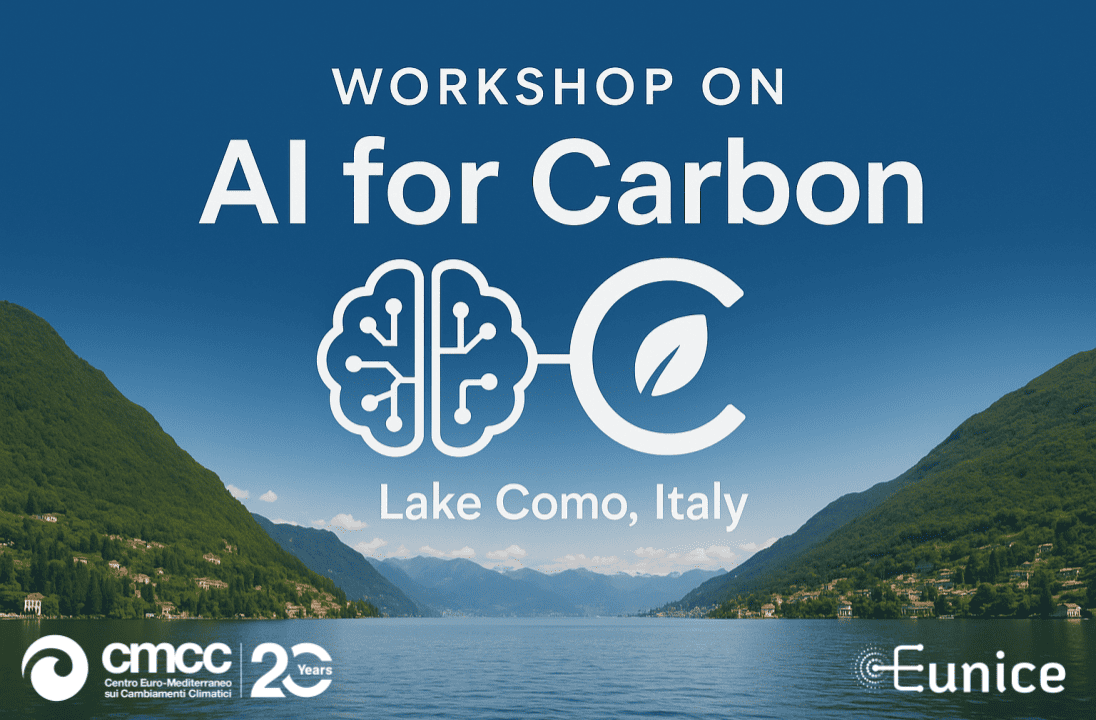Workshop
30 June – 2 July 2025 | Como, Villa Grumello – Lake Como School of Advanced Studies

Climate change is one of the defining challenges of our time, driven by the accumulation of greenhouse gases—particularly carbon dioxide—in the atmosphere. At the heart of this challenge lies the global carbon cycle, a dynamic system that regulates the flow of carbon between the Earth’s atmosphere, oceans, ecosystems, and geological reservoirs. While natural processes have maintained this balance for millennia, human activities—from fossil fuel combustion to land-use changes—now release nearly 40 gigatons of CO₂ annually, overwhelming the planet’s natural sinks and accelerating global warming. To mitigate and adapt to these changes, we need unprecedented innovation in how we monitor, model, and manage carbon fluxes and their interactions with the climate and socio-economic systems.
This workshop, organized within the CMCC Program on Integration of the planetary biogeochemical and industrial carbon cycle (ICC), will explore the potential of Artificial Intelligence (AI) in advancing carbon science and its benefits to society. We will explore cutting-edge AI applications across six thematic sessions:
- Earth System Modeling and Climate Dynamics, exploring AI-driven advancements in Earth system models, from improving parameterizations to enhancing the representation of biogeochemical feedbacks. Discussions will focus on how AI can bridge gaps between high-resolution simulations and computational efficiency.
- Climate Predictions and Extremes, leveraging AI to improve climate projections, early warning systems, and the attribution of extreme events and of their impacts. This session will highlight techniques for analyzing complex climate interactions and improving predictive accuracy.
- Carbon Cycle and Earth System Monitoring, advancing AI applications for real-time carbon flux monitoring, integrating multi-source data (satellite, in situ, and IoT sensors), and enhancing carbon accounting frameworks to reduce uncertainties in emissions tracking.
- Remote Sensing and Geospatial Applications, harnessing AI to process vast amounts of satellite and aerial imagery for carbon stock assessments, deforestation detection, and ocean carbon sequestration monitoring. Innovations in computer vision and deep learning for environmental surveillance will be a key focus.
- Ecosystems and Biodiversity, applying AI to assess the impacts of climate change on ecosystems, model species distribution shifts, and optimize nature-based solutions (e.g., reforestation, soil carbon enhancement) for climate mitigation.
- Economics, Policy, and Society, exploring AI-driven tools for adapting to climate hazards, promoting climate policies, and designing effective and inclusive of low-carbon transitions. Discussions will cover AI’s role in climate policies, adaptation strategies, and scalable decarbonization solutions.
The main objective of the meeting will be to discuss the latest AI carbon science, identify research gaps and priorities and lay out a vision for the future of AI science to serve society. A final brainstorming session will identify research priorities and define the building blocks of a position paper summarizing the needs across the six thematic sessions.
CMCC Speakers
- Dr. Guido Ascenso.
- Dr. Manuela Balzarolo
- Dr. Italo Epicoco
- Dr. Ronan McAdam
- Dr. Simone Mereu
- Dr. Carlos Rodriguez Pardo
External Speakers
- Dr. Sara Beery
- Dr. Laure Berti-Equille
- Dr. Gustau Camps-Valls
- Dr. Millie Chapman
- Dr. Ioana Colfescu
- Mr. Miguel Jiménez
- Dr. Konstantin Klemmer
- Dr. Raphaela Andrea Kotsch
- Dr. Vipin Kumar
- Dr. Christian Lessig
- Dr. Claire Monteleoni.
- Dr. Amirpasha Mozaffari.
- Dr. S. Karthik Mukkavilli
- Dr. Arthur Ouaknine
- Dr. Maria Perez Ortiz
- Dr. Esther Rolf
- Dr. Bruno Sanchez-Andrade Nuño
- Dr. Katarzyna (Kasia) B. Tokarska de los Santos
About the ICC Program
The Integration of the planetary biogeochemical and industrial Carbon Cycle (ICC) Program is one of four strategic research programs within CMCC, focusing on understanding and shaping the new paradigm of building a net-zero carbon economy which is essential to providing quantitative and narrative analyses of socio-economic systems in the context of a sustainable and resilient future.
About the EUNICE project
EUNICE is a project funded from the European Research Council (ERC) to explore deep uncertainties in climate change. It leverages AI methods to quantify the physical and socio-economic repercussions of climate extremes and to identify robust strategies towards climate neutrality.
Funded/Co-funded by the European Union (ERC, EUNICE, project number: 101044703). Views and opinions expressed are however those of the author(s) only and do not necessarily reflect those of the European Union or the European Research Council. Neither the European Union nor the granting authority can be held responsible for them.


